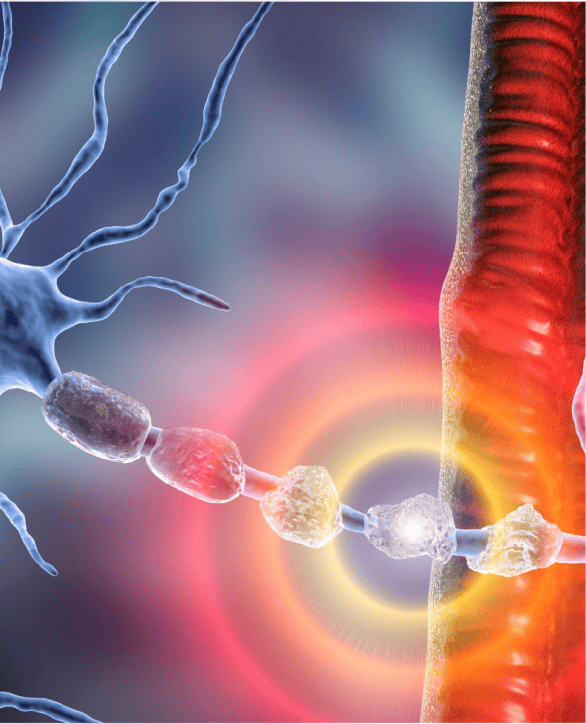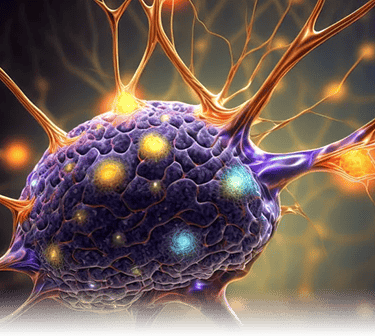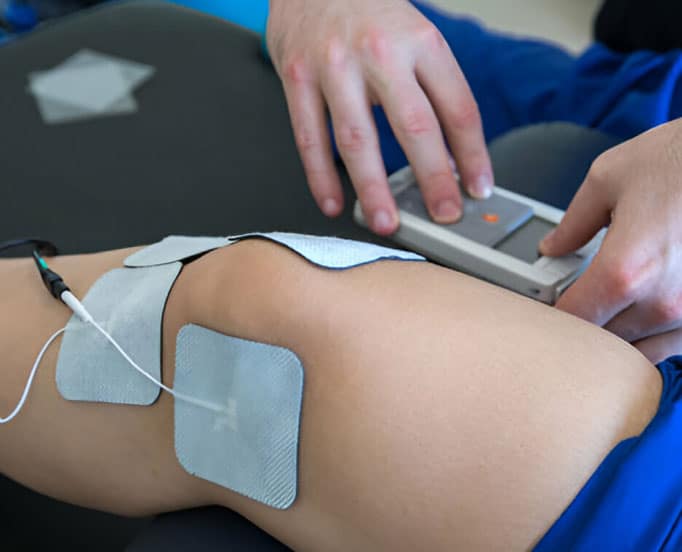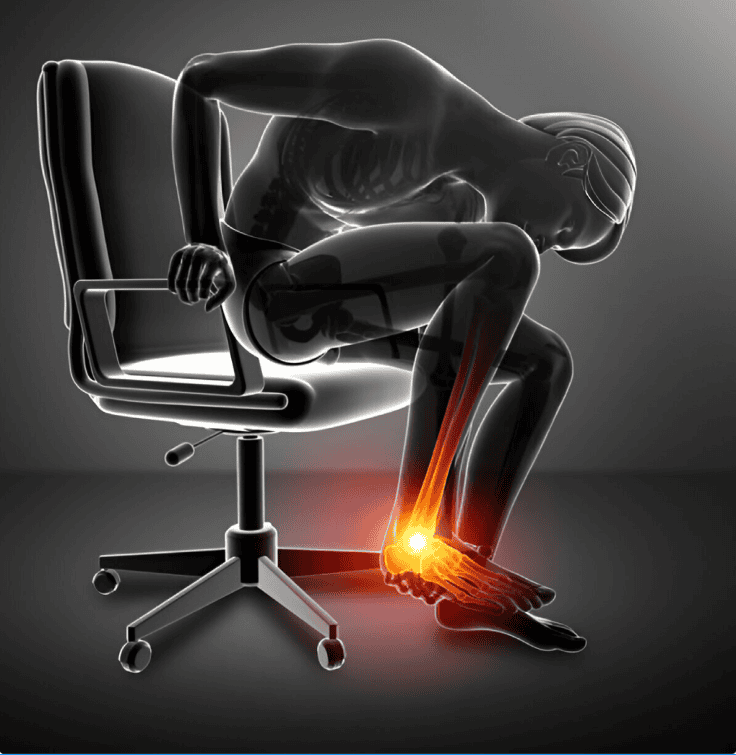Find neuropathy treatment with doctors preferred treatment for neuropathy in legs and feet in Edgemoor, DE
For many Americans, living with neuropathy is one of the greatest challenges they face. Present in about 8% of people around the world, neuropathy - or peripheral neuropathy, to be more accurate - can affect anybody. In the United States alone, there are more than 40 million people with neuropathy, with health costs surpassing $4 billion each year. Approximately 10% of people over 40 years of age get neuropathy, as do 50% of diabetics and 20% of patients receiving cancer chemotherapy. In fact, the number of people with neuropathy is only increasing as diabetes becomes more common, the population ages and people with HIV/AIDS live longer.
While some patients have a higher risk of developing specific types of peripheral neuropathy, it does not discriminate between race, sex, age, personal circumstances, or medical history. Fortunately, neuropathy awareness is growing, and by proxy, so are new treatment options. If you've been suffering from the symptoms of neuropathy and are in search of a solution, Kennedy Health Clinic can help with our doctors preferred treatment for neuropathy in legs and feet in Edgemoor, DE. From advanced therapies to state-of-the-art technology, we utilize the latest advancements in pain management to help you regain your quality of life.
But to truly understand how neuropathy treatment can help, it's important to first understand the disease and how it affects your nervous system.

 variety of symptoms.
Neuropathy 101
variety of symptoms.
Neuropathy 101
Peripheral neuropathy is a term used to describe nerve disorders that affect a specific part of your nervous system. There are several conditions that can lead to peripheral neuropathy, resulting in a variety of symptoms. The symptoms and the body parts affected by peripheral neuropathy depend on the underlying cause.
 Symptom types
The Most Common Symptoms of Neuropathy
Symptom types
The Most Common Symptoms of Neuropathy
Peripheral neuropathy can manifest in a variety of ways. It has the potential to impact a single nerve, a group of related nerves, or numerous nerves in several areas of the body. The specific symptoms will vary based on which type of nerve signals are affected, and it is possible for multiple signal types to be involved.
Symptom types include the following:
- Sensory and Pain
- Motor
- Autonomic
 Diagnostic Testing Needed
Types of Diagnostic Testing Needed for Doctors Preferred
Diagnostic Testing Needed
Types of Diagnostic Testing Needed for Doctors Preferred
Now that we've covered some of the most difficult symptoms to live with when you have neuropathy, you're probably wondering how Kennedy Health Clinic can help. Before recommending treatment, your neuropathy doctor will suggest one or more diagnostic tests for a full-body analysis. Doing so will help our team provide better neuropathy treatment for both short and long-term needs.
 WHY WE BEST
Kennedy Health Clinic's Doctors Preferred Treatment
WHY WE BEST
Kennedy Health Clinic's Doctors Preferred Treatment
People living with neuropathy have to deal with difficulties that most men and women in America don't ever think about. It's understandable, then, that they may become tired and even depressed because of their condition. That's where Kennedy Health Clinic steps in - to provide advanced neuropathy treatments and, ultimately, enhanced quality of life.
 PAINS Suggestions
Four Positive Ways to Manage Stress from Nerve Pain
PAINS Suggestions
Four Positive Ways to Manage Stress from Nerve Pain
 Why choose us
Trust Kennedy Health for Doctors Preferred
Why choose us
Trust Kennedy Health for Doctors Preferred
At Kennedy Health Clinic, we're dedicated to improving the overall health and well-being of our patients. We offer effective pain management treatments and holistic healing options to provide comprehensive care. Our commitment to our patients has made us a trusted partner in health and wellness - and we're ready to help you, too.
If you're suffering from nerve pain or other symptoms due to neuropathy, it's time to seek professional help. Our advanced neuropathy treatments are tailored to your body, your health needs, and your neuropathy goals. That way, we can give you the most effective and efficient care possible. When you trust our team of knowledgeable doctors, you're taking the first step toward a normal life without the painful surprises caused by neuropathy. Contact our office today to get started.
Neuropathy 101
Peripheral neuropathy is a term used to describe nerve disorders that affect a specific part of your nervous system. There are several conditions that can lead to peripheral neuropathy, resulting in a variety of symptoms. The symptoms and the body parts affected by peripheral neuropathy depend on the underlying cause.

The Anatomy of Neuropathy
The nervous system in the human body is divided into two parts - the central nervous system and the peripheral nervous system. The central nervous system comprises the brain and spinal cord, while the peripheral nervous system includes all other nerves present in the body. That includes those that travel from the spinal cord and brain to supply the face and other parts of the body.
Whenever there is any condition that affects the peripheral nerves, it is referred to as peripheral neuropathy. Healthcare providers often use the terms "neuropathy" and "polyneuropathy" interchangeably with "peripheral neuropathy." It is important to note that peripheral nerves, being the farthest from the central nervous system, tend to show the earliest and most severe effects of these conditions.
How Does Neuropathy Affect Your Body?
In order to comprehend the impact of peripheral neuropathy on your body, it's useful to have some knowledge about neurons - a crucial type of cell that forms your nerves. These neurons utilize electrical and chemical signals to transmit and relay messages throughout your nervous system. Each neuron in your body is made up of the following:

Cell Body
A cell body is the primary part of a cell.

Axon
An axon is a long, arm-like projection that extends from the cell body of a neuron. At the end of the axon, there are several finger-like extensions called synapses, which convert the electrical signal in the neuron into a chemical signal. These synapses then transmit the signal to other nearby nerve cells.

Dendrites
Dendrites are small, tree-like extensions on the cell body that receive chemical signals from nearby neurons' synapses.

Myelin
This is a protective covering made up of thin, fatty chemical compounds that surround the axon of many neurons.

The development of peripheral neuropathy and how long it takes depends on its underlying cause. If the cause is an injury, it can develop instantly or within a few hours. However, some forms of peripheral neuropathy caused by toxins or inflammation may develop rapidly over days or weeks. In contrast, most other conditions that cause peripheral neuropathy take months, years, or even decades to develop. Regardless of the cause, modern advances in medicine give patients hope for recovery, using doctors preferred treatment for neuropathy in legs and feet in Edgemoor, DE.
Motor Symptoms of Neuropathy
The peripheral nervous system in your body carries motor signals that originate in your brain and are sent to your muscles. These signals allow you to move around and carry out various physical activities. For your muscles to remain healthy and function properly, they require nerve connections to the brain. Some motor symptoms include:

Atrophied Muscles
Nerve connection loss causes your muscles to weaken and shrink. With peripheral neuropathy, this happens most often in your lower legs, feet, and hands. Occasionally, patients will experience deformities in their hands and feet due to muscle loss.

Muscle Paralysis and Weakness
Muscle weakening is a common issue caused by nerve deterioration from peripheral neuropathy. This condition can result in paralysis, making it difficult to move toes or causing foot drop and hand weakness. Additionally, it can also affect muscles in other areas of the body, such as the thighs and arms.

Uncontrollable Movements
When nerves lose a connection to your brain because of your neuropathy, they can become hyperactive, resulting in uncontrolled muscle movements and cramps.
Did you know that your body has several processes that happen automatically without your conscious effort? These automatic functions are known as autonomic processes, and they include things like sweating, digestion, and blood pressure control. Autonomic nerve fibers are responsible for carrying signals for these automatic processes. However, disruptions in these signals can cause your body's automatic processes to malfunction. Some of these processes may work intermittently, while others may not work at all.
Some autonomic symptoms of neuropathy include:
Kennedy Health Clinic's Doctors Preferred Treatment for Neuropathy in Legs and Feet in Edgemoor, DE
People living with neuropathy have to deal with difficulties that most men and women in America don't ever think about. It's understandable, then, that they may become tired and even depressed because of their condition. That's where Kennedy Health Clinic steps in - to provide advanced neuropathy treatments and, ultimately, enhanced quality of life.

Some of our most popular neuropathy treatments include:
This device is designed to improve blood and oxygen flow, which in turn promotes optimal nerve and nervous system functionality. As a result of the healthy, oxygenated blood, damaged or weak nerve endings receive a rejuvenating boost, which may be experienced as a slight tingling sensation.
Did you know that infrared lights have amazing benefits for our bodies? They can help repair cells and improve the circulation of oxygen-rich blood, which in turn promotes faster healing of deep tissues and relieves pain.
For individuals dealing with diabetic neuropathy, the primary objective is to either reverse diabetes or decelerate its progression. Functional medicine involves incorporating lifestyle modifications to maintain blood sugar levels consistently at a healthy range, which all but eliminates diabetes. Choosing functional medicine recommendations is almost always preferred over invasive and more complicated treatments, and our team is here to help you get started.
Our providers may suggest advanced cellular therapy as a final option for those who have tried other treatments without success and are suitable candidates. This therapy can assist in improving the healing and treatment process of individuals who are experiencing neuropathy.
Living a life free of neuropathy symptoms doesn't have to be a pipe dream - it can be an achievable goal with the help of our advanced neuropathy therapies. Contact Kennedy Health Clinic today to schedule your free initial consultation. Before you know it, you'll be well on your way to long-term recovery and pain relief.
Latest News in Edgemoor, DE
Delaware’s ambitious Edgemoor port proposal loses key permits
Karl Bakerhttps://www.delawarebusinessnow.com/news/spotlight_delaware/delaware-s-ambitious-edgemoor-port-proposal-loses-key-permits/article_3f5d1f98-977d-11ef-8ab8-fb3bc5db058b.html
(Spotlight Delaware is a community-powered, collaborative, nonprofit newsroom covering the First State. Learn more at spotlightdelaware.org) Delaware officials suffered a key setback this week in their quest to massively expand the Port of Wilmington, after a judge in Philadelphia invalidated federal approvals that would have allowed them to construct a new container terminal in Edgemoor.The judge’s ruling follows a lawsuit brought by por...
(Spotlight Delaware is a community-powered, collaborative, nonprofit newsroom covering the First State. Learn more at spotlightdelaware.org)
Delaware officials suffered a key setback this week in their quest to massively expand the Port of Wilmington, after a judge in Philadelphia invalidated federal approvals that would have allowed them to construct a new container terminal in Edgemoor.
The judge’s ruling follows a lawsuit brought by ports in Pennsylvania and New Jersey that challenged construction and dredging permits previously awarded to Delaware by the U.S Army Corps of Engineers.
It also is the latest chapter in a long-simmering powerplay between officials who oversee the Port of Wilmington and those at the Port of Philadelphia for the profits derived from cargo shipments along the Delaware River.
In March, the Port of Philadelphia sued the U.S. Army Corps of Engineers for what they said was a “perfunctory and inadequate review” of Delaware’s permit applications seeking permission to build a Edgemoor port seawall, and to dredge the waters of the Delaware River between the proposed facility and the main shipping lane.
The Delaware River is a busy shipping waterway with ports in Delaware, New Jersey and Pennsylvania, and the more northern states have avidly opposed Delaware’s expansion plans at Edgemoor. | PHOTO COURTESY OF FLICKR / DOC SEARLS
The Port of Philadelphia’s chief complaint was that cargo ships leaving Edgemoor would cause a dangerous marine bottleneck when turning into the river’s main channel, and obstruct the progress of others that were headed upstream toward ports in Pennsylvania and New Jersey.
Attorneys for the Port of Philadelphia also indicated that any such marine congestion would impact their port’s ability to see a return on an $140 million investment made into a Delaware River deepening project completed three years ago.
“Now that the project is completed at no cost to Delaware, it suddenly sees value in usurping the value of Pennsylvania’s investment,” the Port of Philadelphia attorneys said in court documents.
In his ruling on Tuesday, U.S. District Judge Mark Kearney said the Army Corps of Engineers acted “arbitrarily and capriciously” in its approval of the Delaware permits, asserting that the agency dismissed safety concerns posed by an Edgemoor container terminal
The decision comes five months after Gov. John Carney committed nearly $200 million to the construction of the proposed Edgemoor port, which would be built to handle the world’s biggest container ships that are increasingly being used by global shippers following a widening of the Panama Canal in 2019.
In his announcement, Carney asserted that a new Edgemoor port would create “3,100 direct jobs.”
Now, Delaware has few avenues to challenge Judge Kearney’s ruling, because the state is not a party to the lawsuit. Still, Kearney in his written opinion stated that he expects the Army Corps of Engineers to “reevaluate the (Edgemoor) project consistent with this opinion.”
An attorney representing the Army Corps of Engineers declined to comment for this story. A query sent to the agency’s press line was not returned.
Carney’s office also did not respond to email Wednesday seeking a reaction to the judge’s decision.
On Tuesday, Delaware state officials scheduled a last-minute meeting for Friday of the board of the Diamond State Port Corporation, the state-owned entity that oversees port operations and serves as a landlord to the port’s operating company, Enstructure.
The meeting agenda states that the board will “discuss strategy sessions involving legal advice and the content of documents excluded from the definition of ‘public record.’” Those discussions will occur during a secret executive session. It will be followed by public remarks from the board.
In a statement emailed to Spotlight Delaware, Diamond State Port Corporation Director Eugene Bailey called Kearney’s decision “another example of the ports in Philadelphia trying to stop Delaware from building a new facility at Edgemoor to expand our maritime economy and create jobs for Delaware families.”
“While we were not part of the lawsuit, we will work with the Corps to address any concerns so that we can move forward as quickly as possible,” he said.
Moving forward from the decision will almost certainly involve a new Delaware governor as any appeal of Kearney’s decision, or any renewed permit application, would extend beyond January when Carney steps down from his position following the end of his second term.
When asked about plans for the port given the recent court decision, a spokesman for Democratic gubernatorial candidate Matt Meyer said in an email “this is an opportunity to expand” what he called “good union jobs.”
The spokesman, Nick Merlino, declined to provide details about how Meyer would conduct such an expansion without the Edgemoor permits.
Republican gubernatorial candidate Mike Ramone did not respond to questions sent Wednesday about the federal court’s decision.
Disclaimer:


Service Areas


 302-599-6687
302-599-6687 















 302-599-6687
302-599-6687